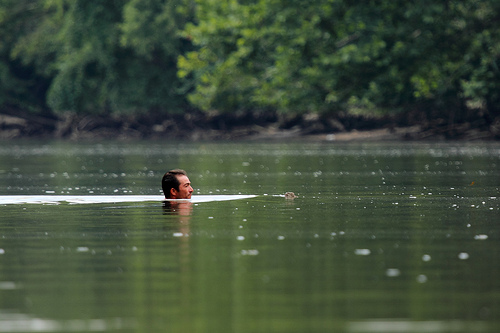 On a hot and humid day in October, a man wandered through the city of Mirebalais, Haiti. He was naked, but his neighbors didn’t pay much attention. The man had always been crazy. In fact, townspeople called him “moun fou” — lunatic or fool. He headed toward the bank of the Latem River, where he was often seen drinking water and bathing. Soon after, he came down with a nasty case of diarrhea. Less than a day after his diarrhea began, he died. A report in this month’s American Journal of Tropical Medicine and Hygiene suggests that this 28-year-old mentally ill man may have been the first Haitian to contract cholera during the recent outbreak, which began in 2010 and has killed roughly 7,000 people and sickened 500,000.
On a hot and humid day in October, a man wandered through the city of Mirebalais, Haiti. He was naked, but his neighbors didn’t pay much attention. The man had always been crazy. In fact, townspeople called him “moun fou” — lunatic or fool. He headed toward the bank of the Latem River, where he was often seen drinking water and bathing. Soon after, he came down with a nasty case of diarrhea. Less than a day after his diarrhea began, he died. A report in this month’s American Journal of Tropical Medicine and Hygiene suggests that this 28-year-old mentally ill man may have been the first Haitian to contract cholera during the recent outbreak, which began in 2010 and has killed roughly 7,000 people and sickened 500,000.
Of course, the researchers can’t be sure. By the time public health officials recognized that a cholera epidemic was underway, the man had been dead for a week. No one took any samples. The team writes, “We believe he is the first or among the first cases of cholera in Haiti during the current epidemic.” (The italics are mine).
In the press, however, this man became patient zero. The New York Times article, titled “Cholera Epidemic’s First Victim Identified as River Bather Who Forsook Clean Water,” begins like this: “The first Haitian to get cholera at the onset of the 2010 epidemic was almost undoubtedly a 28-year-old mentally disturbed man from the town of Mirebalais.” Perhaps the researchers expressed more certainty when the reporter interviewed them. Or perhaps the reporter just told the narrative we all want to hear. Everyone loves the story of patient zero, especially when it involves a mentally ill Haitian who likes to walk around naked and drink dirty river water.
What benefit comes from singling this man out in the scientific literature and the press? I can understand that researchers might want to know how the epidemic began, how it spread, and who’s likely to be affected. But is it really necessary to identify the first individual to contract a disease? In Haiti, the mentally ill are already disenfranchised. The researchers write that the man was “heavily marginalized by the entire community.” I fail to see how a report that says the mentally ill man’s penchant for drinking from the river led him to contract a fatal disease that then spread throughout the country, killing thousands, can improve the situation.
And what about the man’s family? True, the researchers didn’t name the suspected patient zero in their recent report. But they gave so many details, I bet that many in Mirebalais can identify him. Will his parents and siblings now be ostracized?
Patient zeros too easily become scapegoats. Imagine what might have happened had the research team identified the Nepalese peacekeeper who unwittingly carried cholera bacteria from the Himalayas to Haiti. Anger can quickly turn to violence, especially when the target is one specific person.
What’s more, scientists and health officials often pinpoint the wrong person and the press spreads the faulty information. Researchers now suspect that the Canadian flight attendant who was vilified for bringing AIDS to North America contracted HIV long after the virus entered the continent. During the swine flu outbreak, Mexican health officials first named 5-year-old Edgar Hernandez as patient zero. Then they pointed to census-taker Maria Gutierrez (the Daily Mail dubbed her “Typhoid Maria.”) Then, in July 2009, they changed their minds again. Patient zero, they said, might be a 6-month-old baby girl from San Luis Potosí.
Pinpointing the first person to contract a disease takes some impressive detective work, but it misses the point. Cholera doesn’t spread because of a single person. The bacteria spreads because we live in an increasingly connected world. It spreads because people are still living in poverty, drinking dirty river water and shitting in the gutter. It spreads because we are social animals.
We all know it wasn’t this man’s fault he contracted cholera. In the New York Times, Louise Ivers, one of the paper’s authors, points out that the abysmal living conditions in Mirebalais since the earthquake made the epidemic nearly inevitable. “Plenty of families drank from that river, and still do despite the risk,” she said. So why point fingers?
**
Image credit: Mr. T in DC on Flickr
A really nice post. The story of Gaetan Dugas has always driven me nuts; and what was the point? In the movie “Contagion” the index case was demonized as well.
Excellent article. Though I agree it’s dodgy to publicly finger Patient Zero, I do think it’s important epidemiologically to pinpoint who/what/where an epidemic starts.